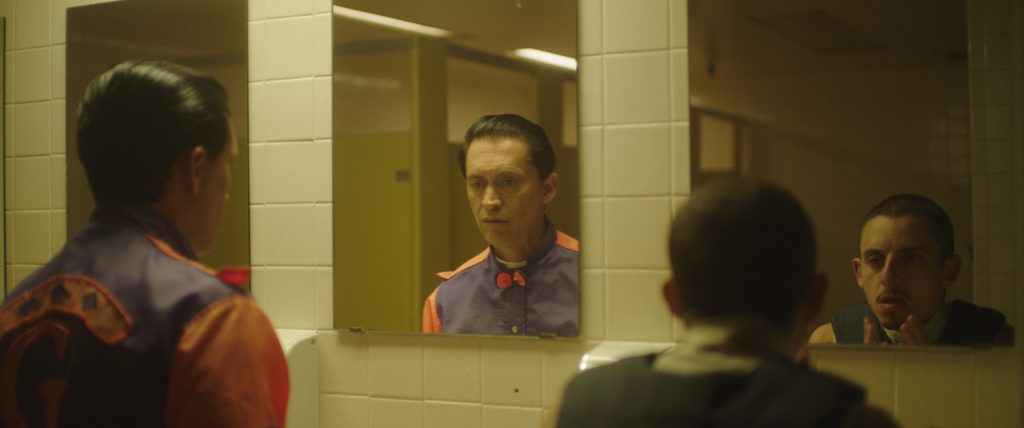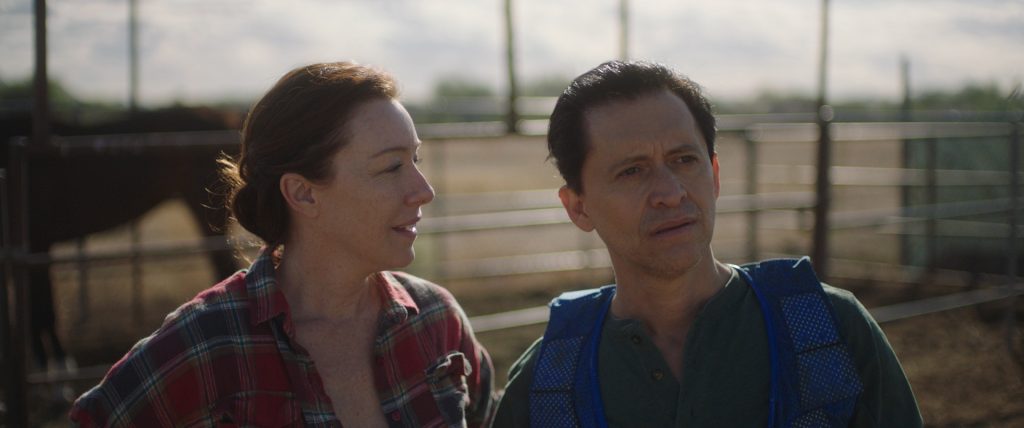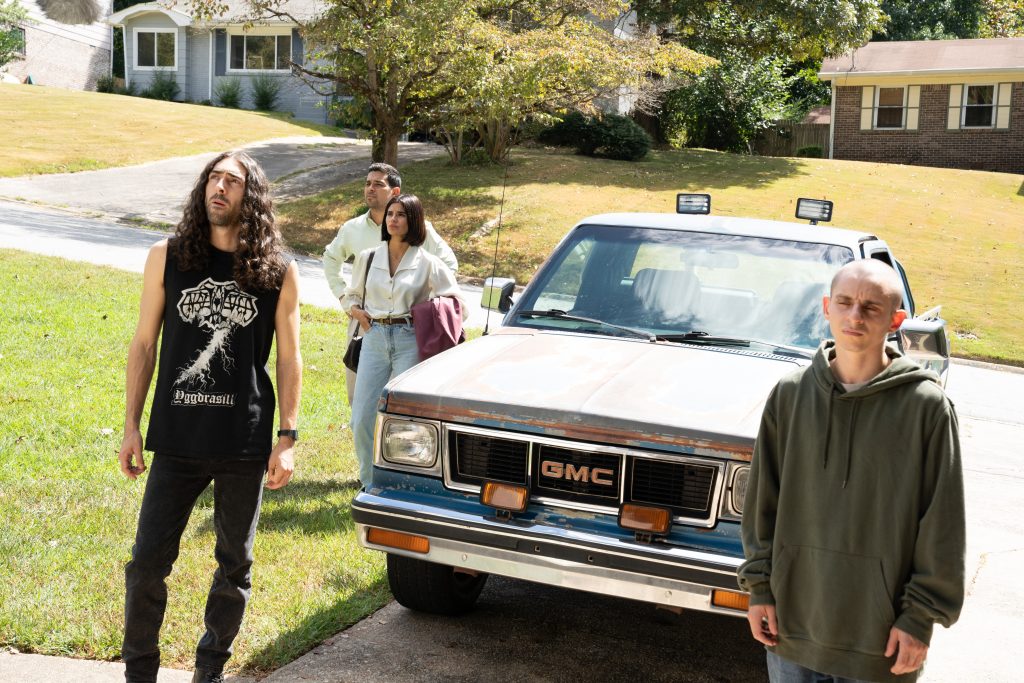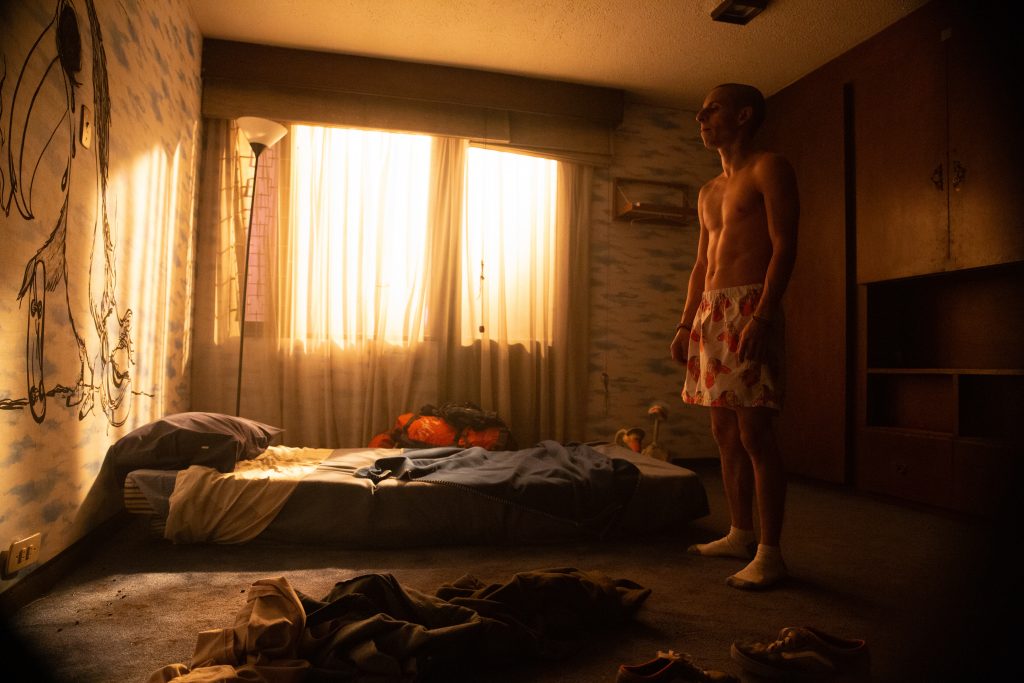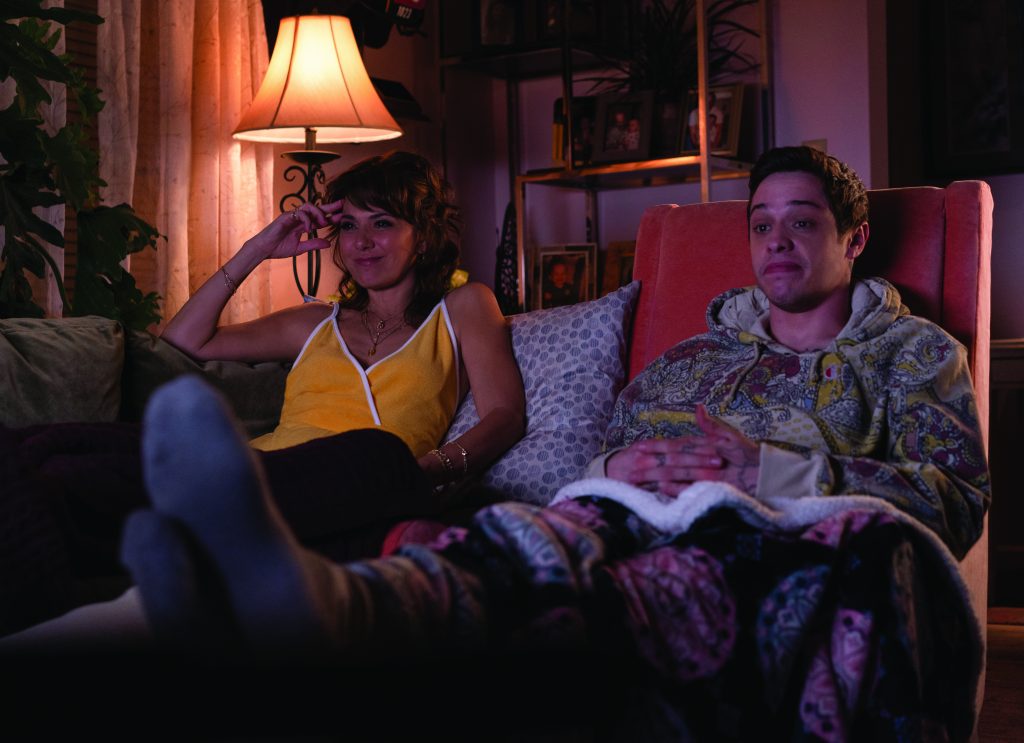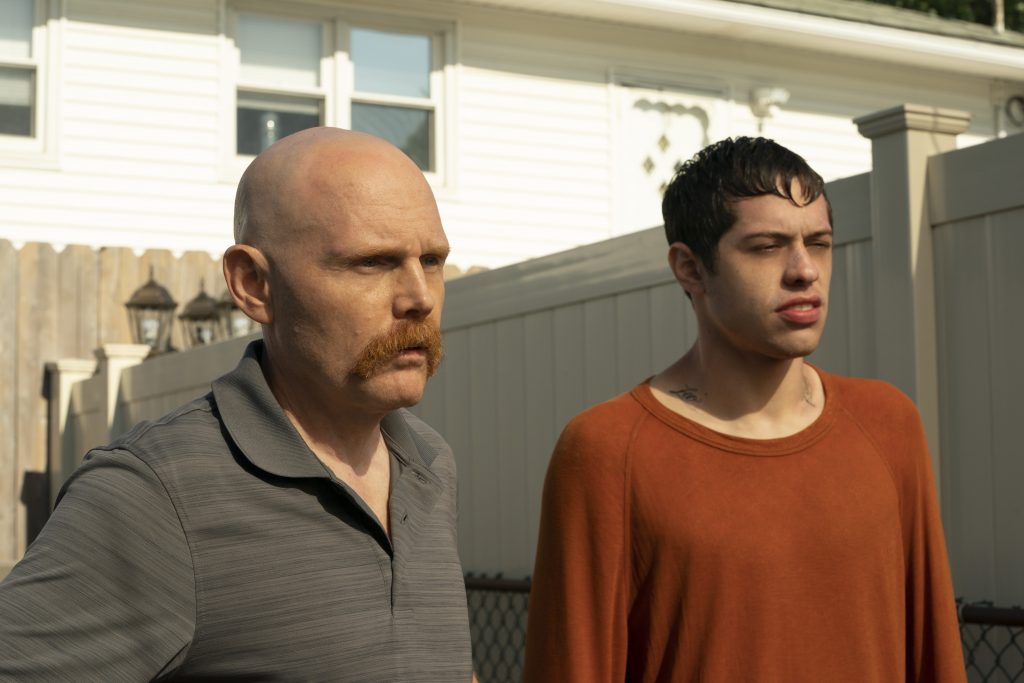November 14, 2022
by Carla Hay

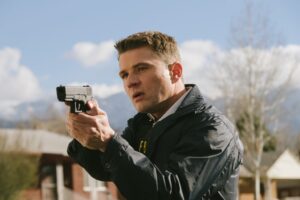
A movie about one of the FBI’s most-wanted criminals should have been intriguing. Unfortunately, the crime drama “American Murderer” wastes the talents of the cast members to deliver a boring story that relies heavily on superficial flashbacks that don’t answer questions. The movie is poorly structured and repetitive in all the wrong ways.
Written and directed by Matthew Gentile, “American Murderer” is about Jason Derek Brown, a longtime con man who was on the FBI’s Ten Most Wanted list for 17 years. Brown is the prime suspect in the murder of Robert Keith Palomares, a 24-year-old armored car guard who was shot and killed during a robbery in Phoenix, Arizona, on November 29, 2004. Investigators say that the killer stole about $56,000 in cash during this deadly robbery.
A bicycle that the gunman used as the initial getaway vehicle was found not far from the crime scene. Brown’s fingerprints were on the bicycle. The shooter used a .45-caliber semiautomatic Glock pistol, which is the same type of gun that Brown was known to have. Brown, who was 35 in 2004, has been on the run ever since this robbery and murder. The charges against him are first-degree murder, armed robbery and unlawful flight to avoid prosecution.
This information is widely known, so it’s not spoiler information to a lot of people who might see the movie. And the film’s title is enough to tell viewers that a murder is going to happen in the movie, so there shouldn’t be any surprise when it does. Brown has not entered a plea to these accusations. And so, technically, until the case is resolved in a court of law, he’s innocent until proven guilty.
But those legal details (and many other details) are completely ignored in “American Murderer,” which has scenes showing Brown committing the crimes of which he’s accused, thereby declaring him guilty before Brown has answered to these charges. (For the purposes of this review, the real Brown will be referred to as Brown, while the character of Jason Brown in the movie will be referred to as Jason.) Even if the filmmakers wanted to stay neutral about declaring Brown guilty or not guilty of the murder, there are too many other problems with “American Murderer” that make it an unworthy story about this case.
“American Murderer” has a tedious and muddled timeline of events that don’t do very much to explain a lot of things that needed to be explained. The murder isn’t shown until 66 minutes into this 101-minute movie. The movie has so many flashbacks, even the flashbacks have flashbacks. The opening scene of “American Murderer” takes place on November 6, 2004, and depicts Jason (played by Tom Pelphrey) going into a pawn shop to sell a luxury watch and a wedding ring.
Viewers will see that Jason is a highly manipulative con man who can act a certain way, tell lies, and create personas of himself to serve whatever purpose that he has, which is usually to swindle people out of money. In this pawn shop scene, Jason tells the pawn broker (played by Chris Harvey) that the watch belonged to his late father, and the ring belonged to his deceased mother. Jason begins to cry when he talks about his mother, whom he says has recently died of pancreatic cancer.
However, Jason is composed enough to haggle over the purchase price for the jewelry. The pawn broker initially offers $1,000 to buy both items. It’s an amount that Jason thinks is unacceptable, so he and the pawn broker do some back-and-forth bargaining until they settle on $2,000 for the sale. Almost as soon as they make this agreement, Jason sees on the shop’s security camera that some rough-looking men are about to enter the pawn shop.
Jason knows who these men are, and he looks apprehensive. He rushes through the sale, gets the money, and asks the pawn shop broker if he can exit through the back door. The pawn shop broker, who’s used to dealing with shady people, can easily figure out what’s going on, and he doesn’t want any trouble in his shop. He lets Jason leave through the back. As soon as Jason makes a getaway in his car, Jason yells triumphantly to himself, “Fucking idiots!”
The next scene takes place at the FBI office in Salt Lake City, Utah, where special agent Lance Leising (played by Ryan Phillippe) is leading the FBI’s investigation to find Jason. This is where the movie’s sloppy screenwriting starts to show. Viewers who don’t know anything about Jason will be confused about the circumstances that would lead the FBI to look for Jason. Based on the title of the movie and the opening scene, viewers will know that Jason is not going to be the subject of an intense manhunt just because he might have sold some stolen jewelry at a pawn shop.
Jason is going to be a suspect for murder, but the “who, what, where, when and why” questions about the murder aren’t addressed until 66 minutes into the movie, when the actual murder takes place. Until then, viewers are kept in the dark (unless they already know the real-life story) about what exactly Jason did that has the FBI putting so many resources into looking for him. A better movie would have told the story in chronological order, or would have at least established from the beginning why Jason committed a federal crime that fell under the FBI’s jurisdiction.
Up until the murder scene, “American Murderer” shows mostly these two types of scenes: (1) interviews conducted by Lance and (2) flashbacks of Jason’s life before the murder was committed. One of the first people whom Lance is shown interviewing in Utah is a real-estate agent named Melanie Baker (played by Idina Menzel), a single mother who owns a house across the street from the house where she lives. For a period of time before the murder happened, Jason was her tenant in the rental house. Jason told her that he and his brother had a successful business importing and exporting golf equipment from Asia.
During the interview, Lance mentions that some of Melanie’s neighbors think that Melanie and Jason had an intimate relationship. Melanie denies that she and Jason ever had sex or dated, but flashbacks show that Melanie is lying. While Jason was signing the rental contract, Jason was very flirtatious and asked her on a date, but she declined the offer because she said that she had to be home when her son leaves school for the day. Still, it’s obvious she’s attracted to him, Jason knows it, and they both act on that attraction later.
Melanie has a son named Zachary “Zach” Baker (played by Asher James), who’s about 11 or 12 years old. Flashbacks show that Jason quickly charmed himself into Melanie’s and Zach’s lives. Jason and Melanie began having sex with each other. Jason got Zach to like him by secretly playing video games with him that Melanie won’t allow Zach to play. Jason also began acting like Melanie’s boyfriend by helping take care of Zach, having meals and sleepovers at Melanie’s place, and buying gifts for Zach and Melanie.
Melanie has this to say about Jason in her interview with Lance: “Maybe he was a little ostentatious and rubbed people the wrong way, but when I needed Jason’s help, he really was there for me.” She adds, “Jason was really great with kids. With all the toys he had and money he threw around, he actually endeared himself to the neighborhood pretty quickly.”
A big problem with “American Murderer” is that it gives these snippets of information but not a full or meaningful picture. For example, it’s mentioned in the movie that Jason was a career con artist for years, but he was only arrested once before the 2004 armed robbery/murder happened. In a flashback scene taking place about eight years before the robbery/murder, Jason is shown stealing golf equipment from a store and being arrested for it the same day.
Even though his arrest for that theft is shown in the movie, “American Murderer” never shows or explains how or why he got away with so many other alleged crimes for so long. What happened to any investigations into his scams? What happened to the victims? Those questions are never answered in the movie.
“American Murderer” also doesn’t fill in many blanks that it creates about Jason’s family background. He was born in Los Angeles and raised in California’s Los Angeles/Orange County region. His parents divorced when he and his two siblings were underage children. There’s a late 1970s flashback scene showing Jason’s father David Brown Sr. (played by Kevin Corrigan) in a small motel room with Jason (played by Dayne Xavier Fox), Jason’s older brother David Brown Jr. (played by Adrian Perez) and Jason’s older sister Jamie Brown (played by Ryan Bingham). The kids are about 9 to 12 years old.
Jamie complains that she wants to go home. David Sr. tells the kids that they are with him because their mother didn’t fight hard enough for custody. Jamie says that he’s lying. David Sr. puts a large wad of cash in the motel room’s safe and gives David Jr. and Jason some money to go play arcade games. The boys are willing to do whatever their father wants, but Jamie is stubbornly mistrustful of David Sr.
This scene is an example of something that is put in the movie but ultimately doesn’t do anything but bring up questions that the movie (once again) never answers. How were these children really raised? What exactly was the custody arrangement after the divorce? This motel scene looks like David Sr. took the kids away from their mother without the mother’s consent, and he’s lying to the kids about it, but everything is so vague in this scene, it’s difficult to come to any conclusions.
Later in the movie, it’s mentioned that David Sr. disappeared in 1994, when Jason was 25 years old, and he still has not been found to this day. There’s nothing in the movie that explains how this disappearance affected Jason and the rest of the family. There’s not even a mention of what the family thinks happened to David Sr. to cause this disappearance.
“American Murderer” also shows that, in 2004, Jason’s mother really isn’t dead, like he claimed in the pawn shop scene. In 2004, Jason’s mother Jeanne Brown (played by Jacki Weaver) is alive and well and has had periods of estrangement from Jason because he’s a pathological liar who only contacts her when he wants money from her. She loves him but she’s become fed up with Jason and his con-artist ways.
One of the movie’s best scenes (in a movie that has very few good scenes) is when Jason and Jeanne have a confrontational argument when he shows up at her home unannounced, after not seeing or speaking to her for three years. Jason is there to ask Jeanne for $20,000 to invest in a business that they both know doesn’t really exist. Much credit should go to Weaver for her exemplary acting talent in this memorable scene, but she’s not in the movie long enough to save it from its shoddy storytelling.
After the 2004 robbery/murder, Jason’s older siblings Jamie (played by Shantel VanSanten) and David Jr. (played by Paul Schneider) come into contact with FBI agent Lance, who interviews them at different points in the movie. Jamie gives more information about Jason than David does. Jamie says their father David Sr. is probably why Jason turned into a criminal. But then, the movie cuts to that 1970s flashback scene of the family in the motel, which doesn’t show anything except that Jamie thinks her father is lying about their mother not caring enough about the kids to fight for custody for them.
“American Murderer” has a scene where Lance interviews a woman who knew Jason because she was his friend from high school. She briefly mentions that Jason used to be married and “a straight-laced Mormon missionary in France.” But don’t expect to see any scenes in the movie showing that part of Jason’s life. Instead, there are several repetitive flashbacks of Jason as a cocaine-snorting jerk who has a habit of partying at nightclubs, showing off whatever luxury car he got with money he scammed, and being a playboy. A better movie would have shown the massive contrasts between his Mormon missionary life and his criminal life that he would have later on.
“American Murderer” also has multiple scenes showing that Jason owed enough money where thugs were following him and sometimes beating him up. At one point, during one of these beatings, Jason is told that he needs to pay the $80,000 that he owes, or else something worse than a beating will happen to him. When an injured Jason tries to get a loan from a bank, his application is rejected. The loan officer (played by Sila Agavale), who notices Jason’s facial injuries, advises Jason to get out of town.
After he fails to get the money he needs, Jason (now living in the Phoenix area) starts planning to rob an armored truck after it picks up money from a movie theater. Jason wants to commit the robbery on a Monday, when he knows that the truck will be carrying cash from the weekend—the period of time when movie theaters do their biggest business of the week. One of the people who knew about Jason’s scheme was a drug buddy named Kyle Wallace (played by Moises Arias), who is interviewed by Lance.
In yet another flashback scene, Jason is shown snorting cocaine with Kyle at Kyle’s home when Jason tells Kyle about the robbery plan and asks Kyle to commit the robbery with him, but Kyle wants no part of it. Jason gets angry about this rejection, so he puts a gun to Kyle’s head in a threatening manner and pulls the trigger. Jason then tells Kyle that the gun is empty, and Jason laughs at Kyle, like it’s all one big joke. Kyle doesn’t think it’s funny at all, and he orders Jason out of his home, but Jason doesn’t want to leave.
Kyle is much smaller than Jason, but Kyle is very angry and gets in a physical scuffle with Jason, which catches Jason off guard. When Jason sees that Kyle is not easily intimidated by him, Jason switches gears and makes profuse apologies for the gun “prank,” but Kyle is unmoved. Kyle manages to cut Jason out of his life by ignoring Jason’s persistent attempts to recruit Kyle for help with the robbery.
In his portrayal of this notorious criminal, Pelphrey seems to be making an effort to depict Jason as a complex “Jekyll and Hyde” personality, but that effort can only go so far when the movie’s screenplay and direction are so shallow and limited. Phillippe’s Lance Leising character is based on the real FBI investigator of the same name, but the character is written and portrayed as very bland and extremely generic. “American Murderer” is just a jumbled mess of scenes that don’t add up to anything but a tedious and substandard “criminal investigation” movie that fails to offer impactful insights into the real people involved in this case.
Saban Films and Lionsgate released “American Murderer” in select U.S. cinemas on October 21, 2022. The movie was released on digital and VOD on October 28, 2022.

